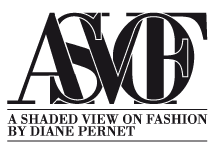Dear Shaded Viewers and Diane,
Recently there has been a wealth of documentaries, articles and news coverage outlining the damage that the West’s appetite for cheap garments causes to the country where the goods are produced. Bangladesh in particular has received significant amounts of press, with recent events entering the public consciousness, and bringing into question the long-term impact of the current production model. The work of two Dutch journalists: De slag om de klerewereld from earlier this year (see all three episodes here) is particularly worthy of mention. During the course of their investigation, one of the undercover journalists explicitly negotiates the production cost with a potential producer, bringing the price down to an unsustainable and ultimately humiliating level for the workers involved. The investigation illustrates not only the willingness of the producers to negotiate to such degrading levels, but also the acceptance that a Dutch merchant would negotiate as such within this corrupt system. One thing that can certainly be deduced from this is that limits and ethics have disappeared behind the cracked walls of foreign ateliers. However the blame cannot rest on just the producers and the merchants – this is something we as consumers are also responsible for.
Fashion’s documentary THE TRUE COST, under its successful worldwide premier last week on Friday, expanded on the recent coverage of unsustainable production models in fashion, shifting toward a much more personal and emotional portrayal of the impact on workers. Director Andrew Morgan expertly contrasts the horrific working conditions within the sweatshops with the clinical and pristine air-conditioned comfort of the H&M’s and ZARA’s where the clothes eventually end up. He binds all the world’s cities and agricultural areas together into one clear narrative, illuminating the interconnectedness of the decisions we make as consumers with the outcomes for workers.
The plight of Mrs Shima (23 years old), and her eight-year-old daughter are a perfect illustration of these outcomes. Her deeply moving story follows her as she works long hours behind her JUKI sewing machine for a mere ten dollars a month. In her struggle, her daughter leaves her to live with her grandparents to escape the life her mother lived – to escape the factories. It is only through education that she is saved, and it is only education that can save us…
As a natural activist against tainted clothing, I have never supported the process of mass production of endless hybrids. The ensuing visual chaos is disrespectful to creativity, to the artists themselves, and as shown in THE TRUE COST, disrespectful to workers. The sensation and ovation around low cost shopping, seems to finally look silly when compared to its consequences.
I leave it up to you for further conclusions on this intelligent narrative; it’s an amazing trip. Enjoy it, and try to propagate its message, especially to tomorrow’s consumers: children. As Colin McDowell said some weeks ago to the BOF: “The fashion industry urgently needs an international body to help regulate key aspects of the business at a global level. Football has FIFA”, meaning we need transparency and organization. I guess not a valid reference anymore, but I support his message’s content; and I am ready to vote.
Best,
Marcelo Horacio Maquieira Piriz.
THE TRUE COST – @truecostmovie
Video © Courtesy of Pr



